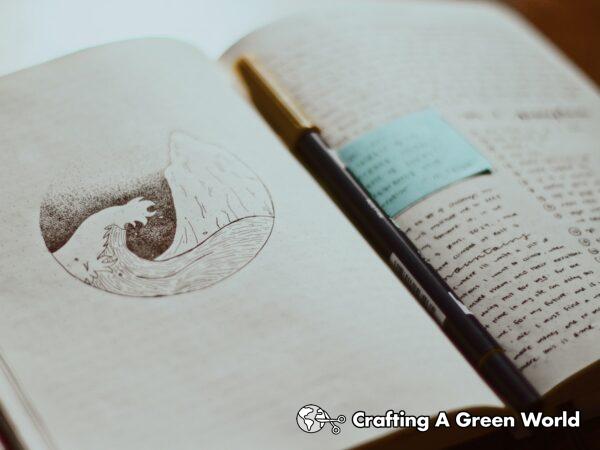Immerse yourself in the wonders of the natural world as you embark on a journey of self-discovery and creativity with nature journal prompts. This type of journaling is a great way to learn about and appreciate the environment at a deeper level whilst nurturing your artistic prowess.
In this article, we’re going to provide you with a collection of nature journal prompts that will stimulate your writing and stir your imagination. Whether you’re a bird watcher wandering in the woods, a beach lover tracing the seashore, or someone simply yearning for a peaceful escape in your backyard – our line-up of prompts is designed to encourage contemplation and reflection about nature.
So, gear up with your journal, find a tranquil and inspiring spot out in nature, and let’s embark on this adventurous, inventive journey together. 🍃🌳
Forest Exploration
Engaging in Forest Exploration through journaling allows one to connect personally with the intricacies of nature, fostering appreciation and mindfulness of our environment. Here are 20 prompts to inspire thoughtful observation and exploration while in the forest:
- Draw or write about three different types of leaves you've spotted.
- Show what the smell of the forest means to you through sketches or words.
- Notice the interplay of sunlight and shadows in the forest – detail your observations.
- Document the sounds you hear – is it animals, the rustling of leaves or the silence?
- Write about your encounter with a forest animal – what did you observe about its behavior?
- Sketch or describe a plant or mushroom you've never seen before.
- Describe the textures of different tree barks you've touched.
- Chronicle the changing colors of the forest throughout your exploration.
- Note the smallest and the largest things you see in the forest.
- Detail the journey of a single raindrop falling onto a leaf or the forest floor.
- Write about how the air in the forest differs from other locations.
- Draw or describe the footprint of an animal you've encountered.
- Reflect on the stillness and movements within the forest – how does it make you feel?
- Identify and document different types of moss or lichen you see.
- Describe a memorable forest trail, focus on the path's features and your emotions as you navigated it.
- Meditate on a tree – write or sketch about your observations and feelings.
- Notice the transitions in the forest as you ascend or descent in elevation.
- Narrate about how the weather changes your forest exploration – how does rain or sunshine transform the forest scene?
- List and describe the various birds you hear or see.
- Write about how the forest landscape changes with different times of day.
Mountain Adventure Prompts
Mountain Adventure Prompts encourage us to connect with the grandeur, mystery, and serenity of high-altitude environments and the unique experiences they offer. Here are 20 prompts to guide your reflections during or following your mountain adventures:
- Describe the feeling of your first step onto a new mountain trail.
- Document the changes in vegetation as you ascend a mountain.
- Write down the sounds you hear and how they change with the altitude.
- Detail your observation of sunrise or sunset from the mountain's peak.
- Recall a challenging moment or obstacle you faced during your climb. How did you overcome it?
- Sketch a bird or animal you encountered on your hike.
- Write a poem inspired by the mountain landscape.
- Describe how the mountain air feels different from the air in other locations.
- Record the different weather conditions you experienced during your ascent and descent.
- Capture the silence of the mountain in words.
- Detail the most inspiring view from your mountain adventure.
- Reflect on your feelings when you reached the peak.
- Catalog the different types of rocks or geological features you noticed.
- Write about the sensation of walking through clouds or mist.
- Describe the scent of the mountain air and how it changes with elevation.
- Reflect on how your perspective changes when you see the world from high above.
- Imagine the mountain could speak. What would it say?
- Write about the feeling of fatigue on the way up and the exhilaration on your descent.
- Describe the night sky as seen from the mountain.
- Reflect on how your mountain adventure has influenced your appreciation of the natural world.
Reflecting On The Seasons
Reflecting on the seasons entails musing upon the constant change and cyclical patterns in nature, thereby informing your appreciation of our natural world. Here are 20 nature journal prompts dedicated to this topic:
- Write about the first signs of spring you observe in your surroundings.
- Describe a feeling or emotion each season instills in you.
- Compare the current season to the same time last year.
- Draw a scene depicting your favorite aspect of the current season.
- What seasonal changes in flora and fauna do you notice around you?
- Reflect on a fond memory associated with the current season.
- Write a poem expressing the essence of the current season.
- How does the change in seasons influence your daily routine?
- Explore the impact of the seasons on local wildlife.
- Describe your favorite seasonal activity.
- How does the weather in each season affect your mood or productivity?
- List the sounds, sights, and smells that encapsulate each respective season for you.
- Journal about the transition from one season to another.
- Reflect on whether you'd miss the seasonal changes if you moved to a different climate.
- Write about a season you are most comfortable in and why.
- Describe seasonal traditions or holidays you enjoy.
- Jot down your thoughts on the role of each season in the life-cycle of plants.
- Write about how the coming season will be different from the previous one.
- Reflect upon how the four seasons metaphorically relate to human life stages.
- How do the changes in weather patterns each season impact your local community?
Bird Watching Insights
Bird Watching Insights provide unique opportunities to observe and reflect on the complexities of nature through the keen eye of an avid bird watcher. Here are 20 journal prompts centered around Bird Watching Insights to invoke thoughtful engagement with nature:
- Describe the most unique bird species you observed today.
- Reflect on the similarities and differences between the birds' behaviors during different times of the day.
- Write about a bird call that stood out to you. Why do you think it attracted your attention?
- Draw or describe in detail a bird's nest you spotted. What materials did the bird use for its construction?
- Note the variations in color and pattern among different bird species you've observed.
- Write about a bird interaction you witnessed. What do you think was happening?
- Describe a moment when a bird's flight pattern intrigued you and why.
- Discuss the changes in bird population you have noticed throughout different seasons.
- Write about a bird that you’ve seen regularly. How have you noticed its habits or routines change over time?
- Document your observations of a migratory bird. Can you discern its origin and destination?
- Reflect on the role of birds in their ecosystem based on what you've observed.
- Describe the characteristics of the most colorful bird you have seen.
- Write about the different types of bird songs and calls you've heard in a single day.
- Reflect on your feelings when you spot a rare or seldom seen bird.
- Write about how the weather affects the behavior of the birds you observe.
- Discuss any unusual bird feeding habits you've witnessed.
- Describe a moment where a bird’s behavior puzzled you.
- Write about the variety in size and shape of the birds you've watched.
- Reflect on your thoughts and emotions when you witness a bird in flight.
- Describe how ongoing observation of birds has deepened your connection with nature.
Inspirations From The Oceans
Drawing inspiration from the oceans taps into the sense of vastness and mystery inherent in these immense bodies of water, offering a rich vein of imagery for nature journaling. Below are 20 prompts related to the ocean to stimulate your thoughts and creativity:
- Describe the sensation of waves retreating from the shore after they’ve broken.
- Imagine you’re a creature of the deep sea. What would your world look like?
- Recall the smell of the ocean. How would you describe it?
- Write about the feeling of sand between your toes as you walk along the beach.
- Imagine discovering an uncharted island. What would the experience be like?
- Reflect on a memory of a sunrise or sunset over the sea. What did you feel in that moment?
- Visualize the life of a sea turtle. Write from its perspective.
- Imagine a conversation between the sun and the ocean. What would they talk about?
- How does the ebb and flow of the tides reflect the natural rhythms of life?
- Compose a letter to the ocean, expressing your thoughts and feelings towards it.
- Describe the sound of ocean waves. How do they resonate with your emotions?
- Write about the sensation of diving beneath a wave, immersing yourself in the sea.
- Imagine you are a lighthouse. What would your daily life be like in the company of the sea?
- If you could talk to a school of fish, what questions would you ask?
- Reflect on the concept of the ocean's depths and the mysteries they could hold.
- Visualize a storm brewing over the ocean. Describe it.
- Write about finding a message in a bottle on the beach. What does the message say?
- Imagine the feeling of surfing a wave. How do you feel as you ride the water?
- Compose a poem inspired by the hues of blue in an ocean scene.
- If the ocean could tell stories, what tales do you think it would share?
Dreamy Sky Observations
Dreamy Sky Observations presents an awe-inspiring chance to gaze at the sky and interpret your feelings, emotions, and thoughts about celestial phenomena into written words. Here are 20 prompts to get you started on your sky-focused nature journaling journey:
- Describe your feelings as you observe the play of colors during sunrise.
- Chronicle the transformation of the sky from day to night.
- What do the shapes of the clouds remind you of?
- Write about a similarity or difference you notice between today's sky and yesterday's sky.
- Jot down any personal memories that a star-lit sky brings up for you.
- Describe how does the sky look just before a rainstorm and how it makes you feel.
- Write a letter to the Man on the Moon. What would you like to tell him?
- Are there any specific constellations visible tonight? Describe their shape and any legends or stories you know about them.
- Imagine the sky as an enormous canvas – what would be the ideal painting?
- Write about the feeling of watching the sky during a quiet early morning.
- How would you depict the changing colors during sunset in words?
- Jot down a poem inspired by the moon and its phases.
- Describe the different weather conditions and how they affect the appearance of the sky.
- Write about how you feel when you see a rainbow after a storm.
- Chronicle a time when the sky reminded you of a significant event or person in your life.
- List the birds or animals you spot against the background of the sky.
- How does the night sky on a clear evening make you reflect on your place in the universe?
- What does witnessing a meteor shower feel like, what thoughts does it provoke in you?
- Imagine a conversation with a star. What questions would you ask it?
- Record the sensations and emotions that a cloudy, overcast sky stirs in you.
Meditations On Wildflowers
Meditating on wildflowers through journaling promotes mindfulness and a deeper connection with the natural world, encouraging observations and thoughts focused on these delicate aspects of nature. Here is a list of 20 journal prompts for meditations on wildflowers:
- Describe the colors and shapes of a wildflower you recently saw. How did it make you feel?
- Imagine being a wildflower seed. Write about your journey from seed to full blooming flower.
- Share a memory associated with a particular type of wildflower. What detail stands out the most?
- Consider a wildflower's life cycle. How does this reflect aspects of human life?
- Sketch a wildflower and detail the components that make it unique and beautiful.
- Write a poem inspired by the beauty and resilience of wildflowers.
- Reflect on the role wildflowers play in their ecosystem and why they're important.
- How do wildflowers contribute to your appreciation of nature and how can you protect them?
- Imagine what life would be like from the perspective of a wildflower. What would you see, feel, or experience?
- Detail the differences and similarities between a wildflower and a garden flower.
- Write about a fictional encounter between a wild flower and an insect.
- Describe the journey of a wildflower's seed carried away by the wind.
- Jot down the thoughts and emotions that surface as you watch wildflowers swaying gently in the wind.
- Share thoughts on what wildflowers might symbolize in your personal life.
- How does the transient life of a wildflower inspire your perspective on time and change?
- Imagine a world without wildflowers. What are the implications and how does it make you feel?
- Record the changes you observe in a specific wildflower over a week. Why do you think these changes occurred?
- How do wildflowers adapt to harsh weather conditions? Draw parallels with human life.
- Write a short story where wildflowers communicate with each other.
- Contemplate the quote, "Wildflowers aren't meant to be cut & tamed. They're meant to be loved & admired." How does this resonate with you?
Creation Of Animal Characters
The concept of Creation of Animal Characters stimulates imaginative thought, encouraging writers to infuse anatomical and behavioral details from wildlife into their story characters. Here are 20 nature journal prompts revolving around the creation of animal characters:
- Picture a woodland creature. Describe its physical attributes and how these attributes help the creature in its environment.
- How would life be from the perspective of a bird in flight? Write a day in the life.
- Choose a sea animal. What characteristics would a character possess if they were inspired by this creature?
- Write a short dialogue between two animals, employing their unique behavior traits and communication styles.
- Flesh out a character inspired by an insect's life. Describe how its distinctive lifestyle influences the character.
- Hypothesise the unique toolset of a character based on the survival tactics of a predator animal.
- Imagine a character with the abilities of an amphibian. How would these capabilities shape their life?
- Devise a backstory for a character whose traits are inspired by a nocturnal animal.
- Describe a character conflict inspired by the relationship between animals in a food chain.
- Select an endangered animal. How might its struggle for survival personify in a character's traits or story arc?
- If a character had a spirit animal, which one would it be and why?
- Visualize a mythical creature based on a combination of different animal features.
- Observe a pet or a group of animals for 30 minutes and write a story capturing their behaviors into character interactions.
- If a character's emotions were represented by different animal behaviors, what would they look like?
- How would a character's resilience reflect in their personality if they were inspired by a desert dwelling animal?
- Write a monologue for a character that is based on traits from an animal in the wild.
- Compare the life cycle stages of an animal to the growth and transformation of a character.
- Conjure a world where the societal hierarchy is inspired by the social structure of a specific animal kingdom.
- Sketch an animal-inspired character adept at camouflage. How would this trait benefit their lifestyle?
- Explore the relationship between two characters inspired by a symbiotic relationship between two different species.
Storm Watching Musings
Storm Watching Musings in the context of nature journal prompts ignites introspective thought and fuels creativity during turbulent weather periods. Here are 20 prompts to inspire your weather-inspired entries:
- Describe the first few moments leading up to a storm. What changes do you observe in the environment around you?
- What do you feel as the storm approaches? Is it anticipation, anxiety, excitement or calm?
- Write a metaphor comparing the storm's progression to a symphony or a ballet.
- Capture the storm's peak intensity in your words. How is it both destructive and beautiful at the same time?
- What thoughts come to mind as you hear the crashing sound of thunder?
- Create a dialogue between the storm clouds and the earth below.
- What feelings emerge when you see the first raindrop fall?
- How does the smell of wet earth affect you? Write about the memories it stirs.
- Describe the color of the sky during the storm and the overwhelming ambiance it creates.
- Draw or describe the most impressive lightning you've ever witnessed.
- Are there any special snacks or foods you enjoy during storms? Associate a particular taste with a storm scene.
- Is there a calming silence after the storm passes? How does it compare to the storm's peak?
- Look around; how has the storm transformed your surrounding landscape?
- What rituals or habits do you have during a storm? Write about where they originated from and why they are important to you.
- Explore your inner feelings of joy, relief, or melancholy when the storm ends.
- Write a poem from the perspective of a tree experiencing the storm.
- Notice the animals before, during, and after the storm. How do their behaviors adapt to the changing weather?
- Detail the moment the sun peeks back through the clouds after a storm's passing.
- Write a weather report as though you are a 19th-century weather observer experiencing the storm.
- Reflect on any lessons or insights the storm-watching experience has given you.
Stream Of Consciousness From Rivers And Streams
Incorporating streams of consciousness from rivers and streams in nature journaling encourages reflective thoughts to flow freely, inspiring fresh insights and deeper connections with the natural environment. Here are 20 prompts to tap into your intuitive flow with the help of nature's waterways:
- Visualize a river or stream you're fond of. Describe its course from source to mouth.
- Write about the soundscape of the river or stream. How does it make you feel?
- Imagine becoming raindrop merging with a river. Describe the journey.
- How would you describe the texture of a river or stream? Smooth and tranquil, or rapid and tumbling?
- List five ways a flowing river or stream changes with the seasons.
- Write about the life forms found in and around a river or stream.
- Describe how the morning sunlight reflects off the river's surface.
- Write about the feeling of dipping your fingertips into cool, fresh stream water.
- Illustrate the relationship between the river or stream and its surrounding landscape.
- Have you ever thrown a stone into a river or stream? Describe its ripple effect.
- Write a metaphor comparing your thoughts with the current of a river or stream.
- Contrast a busy, city river with a solitary mountain stream.
- Describe the smell of a river or stream after a heavy rain.
- Imagine a river talking to a stream. What would they say about their experiences?
- Write about a significant memory involving a river or stream.
- Picture a leaf navigating the currents of a river or stream. How does it feel?
- Write about the sense of peace you feel sitting by a river or stream.
- Describe the transformation a river or stream undergoes from dawn to dusk.
- Picture the river or stream in winter. How does it change?
- Reflect on how the constancy of a river's flow relates to your own life journey.
Sunset Appreciation Prompts
Sunset Appreciation Prompts can provide a serene and reflective catalyst for your nature journaling, encouraging you to explore the visual beauty, calming essence, and symbolic meanings of the setting sun. Here are 20 writing prompts to guide your sunset appreciation:
- Describe the colors you see in the sunset. What emotions do they evoke?
- Write a poem inspired by the sunset's beauty.
- Document the gradual change from day to night as the sun sets.
- List three positive things that happened today as the day concludes with the sunset.
- Write a letter to the sun thanking it for providing light and life.
- Capture the feelings the sunset brings forth in you, does it bring peace, somberness, or perhaps hope?
- Imagine the sunset as an orchestra playing a symphony. What instruments would play the colors, the setting motion, and the onset of night?
- Reflect on the impermanence of each day as symbolized by the sunset.
- Describe the silhouette of the landscape against the setting sun.
- Write a story or a scene based on the hues and feelings of today's sunset.
- How does the sunset inspire you to conceive personal change, growth, or evolvement?
- Contemplate the creatures preparing for the night as the sun sets. What are they doing and how does it impact you?
- Document the dance of shadows as the sun sets. How do they play with the elements around you?
- Draw or describe the visual pattern the setting sun makes on water (if you're near a body of water).
- Pen down two sensory phrases that capture a sunset you've watched, one for sight, the other for sound.
- Reflect on how the sunset impacts the temperature and your physical senses.
- Discuss the concept of closure or endings denoted by a sunset and how it applies in your life.
- Illustrate the invisible – Imagine how the setting sun touches and changes things in places you can’t see.
- Write a haiku encapsulating the calmness that descends as the sun dips below the horizon.
- As the night takes reign with the setting sun, pen down your intentions for the day that is to follow.
Rhythms Of Rainy Days
Rhythms of Rainy Days in nature journaling refers to the exploration of weather patterns, observing and recording the impact they have on natural phenomenon and introspective reflections. Below are 20 journal prompts to inspire your writing about rainy days and their influence.
- Describe what you feel, hear, see, smell and taste when a rain storm approaches.
- Write a poem inspired by the steady rhythm of rainfall.
- Delve into how the garden or park changes after a good rain.
- Record and interpret the behavior of birds or other wildlife during a rainy day.
- Reflect on how rainy days affect your mood and thoughts.
- Write a letter to the rain – what would you say?
- Describe the feeling of walking in gentle rain compared to a heavy storm.
- Detail the formation of a raindrop or the life cycle of a puddle.
- How does the color palette of your surroundings change during and after the rain?
- Analyze the way rainwater interacts with different surfaces.
- Describe the sensation of rain: the touch on your skin, the smell in the air.
- Write about the changes in the sounds around you when it starts to rain.
- Observe the path of a single raindrop down a window. Where does it go? What journey does it take?
- Compare the rain in different seasons. How does a spring rain differ from a fall rain?
- Make a sketch of a rain-soaked landscape.
- Record observations of a plant or tree before, during, and after a rain shower.
- Reflect on a vital moment in your life that happened on a rainy day.
- Create a list of your favorite activities to do on rainy days and why they appeal to you.
- Write a short story about an animal during a rain shower – what do they do, how do they react?
- Spend time outside in the rain, then describe the experience and your thoughts during this time.
Wonders Of The Wilderness
Wonders of the Wilderness captures the awe-inspiring aspects of nature that can spark thoughtful reflection and deeper appreciation in your journaling journey. Here are 20 wilderness-themed prompts for your nature journal:
- Write about a particular sound in the wilderness that you find soothing.
- Describe your favorite wild animal and why it fascinates you.
- Recount a unique weather event you experienced while in the wilderness.
- Sketch or describe in words the most breathtaking sunrise or sunset you've seen in the wild.
- If you could personify a forest, how would you describe its personality?
- Imagine spending a day as any creature of the wilderness – who would you choose to be and why?
- Recount an experience when you felt completely connected to nature.
- Reflect on the sensory details of a memorable wilderness moment.
- Write a haiku inspired by a wilderness location.
- Describe how the changing seasons impact a specific place in the wilderness.
- Write about a plant, tree, or flower in the wilderness that captivates you.
- Imagine the wilderness at night. What sights, sounds, and sensations might you experience?
- Reflect on why preserving wilderness areas is important.
- Write about a lesson you've learned from observing the natural world.
- Describe an extraordinary natural phenomenon you've read about or seen.
- Write about your thoughts and feelings while beside a river or stream.
- Draw or write about a striking rock or mountain formation and its symbolism to you.
- Describe the feeling of a wilderness element against your skin, like the breeze, sunshine, or rain.
- Recount a time when a wilderness experience changed or challenged your perspective.
- Reflect on the solitude of wilderness and how it influences your thoughts and senses.
Family Farm Reflections
Family Farm Reflections in nature journaling provides a space to contemplate the rhythms of rural life and the natural world. Here are 20 prompts for pondering your Family Farm Reflections:
- Describe how the change of seasons on the farm influences your daily activities.
- Write about a farming task or chore that you find both challenging and rewarding.
- Recall a favourite childhood memory involving farm animals.
- Discuss a lesson you learned from growing a plant or crop.
- Write about a wildlife encounter that left a lasting impression on you.
- List the different sounds you hear on the farm throughout the day and what they signify.
- Reflect on how weather patterns affect farm life.
- Discuss a past farming mistake and what you learned from it.
- Write about the feeling of a successful harvest.
- Pen a letter of gratitude to the land and everything it provides.
- Reflect on the cycles of life and death observed on the farm.
- Write about the farm's role in your family's history.
- Describe the connection you feel to the generations before you who lived and worked on the land.
- Contemplate the role of technology on the farm and its influence on your life.
- Write about the farm's ecosystem and its intricate web of life.
- List ways farming has shaped your understanding of work and responsibility.
- Discuss how your relationship to food has changed because of farm life.
- Reflect on how the farm has shaped your perspective on environmental issues.
- Revisit an incident when a adversity was faced and conquered on the farm.
- Write an account of an ordinary day on the farm, emphasizing small, beautiful moments that make it special.
Inspirations From Indigenous Flora And Fauna
Drawing inspirations from indigenous flora and fauna opens a unique avenue in nature journaling that deepens our appreciation for local biodiversity and fosters creativity. Here are 20 writing prompts centered on exploring these elements:
- Write about a native plant in your area and describe its lifecycle.
- Imagine you're an indigenous creature—describe one day from your perspective.
- Reflect on a recent encounter you've had with local wildlife. How did it make you feel?
- Sketch a local tree. Next to it, write about its importance to the ecosystem.
- Choose a local bird species and create a poem inspired by its song.
- Journal about the changes in local vegetation throughout the seasons.
- Choose an indigenous creature—research and write about its survival mechanisms.
- Describe the scent of a native flower.
- Document how the local fauna interacts with their environment.
- Compare two native plant species in terms of their colors, textures, and sizes.
- Write about a local animal, focusing on its behavioral traits.
- Compose a short story about a day in the life of a local insect.
- Reflect on how indigenous flora and fauna contribute to the local culture.
- Write a letter from the perspective of a native animal facing an environmental threat.
- Draw a native plant and write about the purpose of each part of it.
- Describe the interconnected relationships between several local plants and animals.
- Write a myth or a folklore about the origin of a native species.
- Document the soundscape around you and identify the sounds made by local fauna.
- Write a reflection about a local aquatic body's role in supporting your area's fauna.
- Imagine how a patch of local flora might change in the next 50 years.
Appreciating The Night Sky
Through observing and expressing thoughts on the night sky, we can foster a deeper connection with nature and expand our creative horizons. Here are 20 prompts centered around appreciating the night sky for your nature journal:
- Illustrate your favorite constellation, and write about why it appeals to you.
- Draft a poem that captures the ambiance of a star-filled night.
- Jot down your feelings when you gaze at the moon in its different phases.
- Sketch how the landscape changes under the cover of night sky.
- Write a letter to an extraterrestrial being, explaining what the night sky looks like from Earth.
- Imagine being an astronomer for a night, and pen down your discoveries.
- Try to capture the tranquility of the night sky in three sentences.
- Document the movement of planets that you observe over a month.
- Describe the sensation of watching a shooting star streak across the sky.
- If stars could talk, what questions would you ask them?
- Write about how different the world seems under the glowing moonlight.
- Compose an ode to the night sky, celebrating its mysteries.
- Describe the colors you perceive in the night sky.
- Pen down a dream where you could touch the stars.
- Write about the sense of perspective the night sky offers you.
- Recount a personal experience that unfolded under the night sky.
- Pen an imaginary story about star-crossed lovers who only meet under the blanket of night.
- Sketch the full moon and note down any legends or myths you know relating to it.
- Chronicle a night when the sky was exceptionally clear, stars twinkling beautifully.
- Document what the night sky makes you ponder about the universe and your existence in it.
Mystery Of The Full Moon
Observing and writing about the mystery of the full moon can spark wonder and creativity, helping us connect more deeply with nature and its beautiful rhythms. Here are 20 nature journal prompts focused on the Mystery of the Full Moon:
- Describe how you feel when you see a full moon. Does it stir any particular emotions or thoughts?
- Write a poem or haiku inspired by the full moon.
- Record any changes you notice in your surroundings during a full moon.
- Sketch the full moon and annotate your drawing with observations.
- Document any interactions between the full moon and water bodies like a lake or ocean.
- Discuss how the light of the full moon illuminates the night and affects your surroundings.
- Imagine the surface of the moon, its texture, its landscape. Write a detailed description.
- Reflect on the influence of the full moon on plants, animals, or even humans.
- Write about a moonlit walk. What would you see, hear or feel?
- Investigate and write about the scientific or cultural reasons behind the term 'mystery of the full moon'.
- What legends or folktales from your culture or others do you know about the full moon?
- Reflect on the phases of the moon leading up to the full moon and how they affect the natural world.
- How might the full moon influence or enhance certain activities like fishing or stargazing?
- Chronicle a conversation you would have with the full moon if it could talk.
- The full moon often symbolises completeness or harvest in many cultures. Delve deeper into this symbolism.
- Many animals behave differently during a full moon. Investigate and document these changes.
- Write about a memory or dream associated with the full moon.
- Explore possible connections between the moon cycle and your personal moods.
- What does the full moon reflect in your personal life or experiences?
- Write a short story or scene set in the bright light of the full moon.
Unfolding The Butterfly’s Journey
Observing and reflecting on the butterfly's journey from egg to adult is a journey of transformation and beauty that offers abundant inspiration for nature journaling. Here are 20 prompts to guide your exploration of this magical process:
- Sketch the egg stage and describe the anticipation that comes with waiting for it to hatch.
- Write a diary entry from the caterpillar's viewpoint on its first day in the world.
- Imagine what thoughts the caterpillar might have as it begins to eat leaves.
- Chronicle the growth of the caterpillar day-by-day in a series of sketches and observations.
- Capture in words what you believe the caterpillar experiences during its rapid growth.
- Reflect on the purpose and symbolism of the caterpillar's numerous tiny legs.
- Visualize and write about the moment when the caterpillar begins creating its cocoon.
- Ponder on the vulnerability of the caterpillar during its pupa stage.
- Describe the wonder and bewilderment the caterpillar might feel as it metamorphoses.
- Contemplate and express the uniqueness of each butterfly's individual cocoon journey.
- Sketch the chrysalis stage and appreciate its silent beauty.
- Predict what you think will emerge from the chrysalis, with detailed descriptions.
- Write a letter from the emerging butterfly to its former caterpillar self.
- Write a poem celebrating the transformation from crawling caterpillar to winged wonder.
- Depict the butterfly's first flight and capture the thrill of newfound freedom.
- Describe the butterfly's first experience of sipping nectar from a flower.
- Explore how a butterfly might perceive the world with its compound eyes.
- Draw the flight path of a butterfly and interpret its seemingly random flight pattern.
- Write about the sensation of a butterfly landing on you, from the butterfly's perspective.
- End with a reflection on the complete life cycle of a butterfly and find a personal connection with its transformative journey.
Voicing The Silence Of Nature
Voicing the Silence of Nature is about articulating and recording the subtle messages and insights you perceive while immersing in the tranquility of nature. Here are 20 prompts to guide you in capturing the silent whispers of the wild:
- Describe the sounds you hear in nature's silence.
- Reflect on how the quiet of nature impacts your mood.
- What kinds of thoughts come up for you while sitting silently in nature?
- Write a dialogue between you and an element of nature.
- Illustrate the sense of peace you experience in nature's silence.
- Describe the contrast between natural silence and manmade silence.
- Reflect on a powerful insight you received from observing nature.
- Write a poem to express the silence of a natural scene.
- How does the silence of an early morning sunrise make you feel?
- Record your meditative encounters with the silent language of the trees.
- Imagine the secret stories told by the silent rustling leaves.
- Capture the tranquility of a silent forest in different seasons.
- Interpret the silent communication between different species in nature.
- Convey the calmness elicited by a river's silent flow.
- Share how the silence of the mountains resonates with you.
- Write a letter to a loved one, attempting to articulate the silent strengths of nature.
- Explain how listening to the silence in nature can bring about self-discovery.
- Describe the silence of the night sky. What thoughts or feelings does it inspire?
- Channel the silence of the wild sea into an imaginary story.
- Reflect on how the quietude of nature helps you connect with your inner self.
Adventures In Gardening
Adventures in Gardening invites us to observe, interact, and reflect on our personal journey with gardening and the wonders of growing and nurturing plants. Here are 20 prompts that can guide your querying mind:
- Recall a time when you first experienced the joy of gardening. What sparked the excitement?
- Reflect on several challenges you've faced while gardening. How did you handle them?
- Note a memorable plant you've grown. What made it unforgettable?
- Tell the story of a plant that didn't thrive. How did you feel and what did you learn?
- Observe and describe the daily growth of a specific plant. What changes are most striking?
- Recall your feeling the first time you successfully grew a plant from seed to fruit.
- Write about your interaction with wildlife in your garden.
- Describe your favorite element of gardening and why you enjoy it.
- Detail the steps you took to prepare and plant your garden.
- Describe a gardening Fail and how you responded to that failure.
- Consider a plant or fruit you would like to grow but haven't yet. Why have you chosen that?
- Write about a beautiful moment you've experienced while tending to your garden.
- Recall a situation where gardening helped you find peace or relaxation.
- Detail the sensory experiences of gardening, focusing on the smells, sights, and feels that bring you joy.
- Describe a plant you have nurtured from seed to bloom. What journey did you and the plant undertake?
- Write about the seasonal changes in your garden. How does each season affect your plants and your gardening practices?
- Tell the tale of your most rewarding day in the garden.
- Note what motivates you to wake up and tend to your plants every day.
- Write a letter to your future self about your current gardening experience.
- Describe your favorite spot in your garden: What makes the spot special and why do you enjoy being there?
Gifts From The Public Garden
Gifts from the Public Garden, in relation to nature journal prompts, encourages the exploration of the simple gifts, in the form of observations, insights or materials, we can receive from spending time in public gardens or parks. Here are 20 writing prompts inspired by the Gifts from the Public Garden:
- Describe a plant that caught your attention. What made it stand out?
- Write about the scents you experienced in the garden. How did they make you feel?
- Detail an interaction you witnessed between animals or between animals and humans.
- Discuss how the public garden changes with the seasons. What are some differences you’ve noticed?
- What is the most beautiful thing you’ve seen in the garden? Why did it strike you?
- Write about a moment of quiet or calm you experienced in the garden.
- Have you discovered any edible plants in the garden? Describe their taste or texture.
- Reflect on the sounds of the public garden. How do they different from the sounds in your everyday life?
- List three things in the garden that surprised you.
- Describe the texture and sensation of various surfaces you’ve encountered (tree bark, leaves, grass, etc.)
- Illustrate the path you usually take when you visit the garden. What makes it your favourite?
- Write about a time when the garden provided comfort during a challenging time.
- Detail the human activity within the public garden. How does it affect the garden ecosystem?
- Reflect on the impact of seasonal changes on the collective mood in the garden.
- What past memories does your public garden bring back?
- Predict how the public garden will change in the next 10 years.
- Write a conversation between two trees in the public garden.
- Describe the colors you see in the garden. How do they change with the time of day or season?
- Recall an unexpected or unusual encounter in the public garden.
- Reflect on how your visits to the public garden have affected your life or perspective.
Insights From Insect Life
Observing and understanding insect life can pave the way for deep reflections about nature and our place in it. Here are 20 prompts to inspire you to delve into insights gained from studying this tiny, but complex world:
- Describe an interaction you observed between any two insects. What could be the possible reasons for their behavior?
- Pick a type of insect. How would you imagine a day in its life?
- Write about a time when you discovered an insect in an unexpected place. What was your initial reaction?
- Discuss the life cycle of an insect of your choice, including its metamorphosis. How does this process echo patterns of change in your own life?
- Identify three unique characteristics of an insect you've seen recently and how they aid its survival.
- Reflect on the social structure observed in insects like ants or bees. What lessons can we learn from them?
- Consider how insects contribute to the ecosystem. How can such small creatures create big impacts?
- Name three insects you feel are misunderstood or misrepresented and justify why.
- Choose an insect that you fear or dislike. Write a paragraph trying to empathise with its existence.
- Observe an insect in motion. How does its movement inspire you creatively?
- Write about an insect's attributes that you admire and why.
- Discuss the parallels you find between insects' roles in their communities and human societal roles.
- Imagine you are an insect. What would you feel, see, or hear?
- Reflect on how an insect's lifespan, often much shorter than that of humans, affects its experiences of the world.
- Identify an insect's adaption that you find fascinating. How might this inspire human innovation?
- Write about the harmony in an insect colony and what principles humans can adopt from it.
- Discuss the significance of color in insects' lives. How does it compare to the role color plays in human life?
- Choose a common insect and research an interesting trait of it. Did anything surprise you?
- Reflect on an insect's resilience. How does it inspire your own perseverance?
- Observe an insect's environment. Discuss how the insect adapts to it and what we, as humans, can learn from such adaptability.
Tales From Tidal Pools
Exploring the wonder and intricacies of coastal ecosystems through journals can magnify our understanding and appreciation of the natural world. Direct your attention towards tidal pool environments with the following 20 writing prompts:
- Describe the overall atmosphere and surroundings of a tidal pool you've visited.
- Write about a unique sea creature you observed in a tidal pool. What captured your interest?
- Reflect on the vibrant colors and pattern variations in a tidal pool. How does it inspire you?
- Recall an experience where you discovered something unusual in a tidal pool.
- Detail how the tide changing affects the appearance and behavior of a tidal pool.
- Envision how a tidal pool ecosystem might change with the seasons.
- List the variety of species you can find in a tidal pool and their attributes.
- Describe the memory of a time you explored a tidal pool during a storm. How did it differ?
- Journal about the symbiotic relationships you've observed in tidal pool dwellers.
- Reflect on the fragility of tidal pool ecosystems. How can we protect them?
- Describe the sensory experience of exploring a tidal pool – the sounds, smells, sights, and textures.
- Write a narrative about a day in the life of a tidal pool creature.
- Describe the lifecycle of a species that calls the tidal pool its home.
- Reflect on a moment of awe or joy experienced while exploring a tidal pool.
- Write about the flow of life within the tidal pool as the tide enters and exits.
- Detail how coastal weather impacts tidal pool compositions.
- Illustrate the beauty of a tidal pool at sunrise or sunset. How does the light play with the water?
- Journal about the serenity and stillness of a tidal pool when it's untouched by human presence.
- Imagine the challenges a tiny creature might face during a day in the tidal pool.
- Write about lessons we can learn from observing the resilience of tidal pool life.
Seashell Collections And Discoveries
Collecting and discovering seashells presents a wealth of insight into nature's beauty and variety, offering numerous topics for exploring and documenting through nature journal prompts. Here's a collection of 20 seashell-related prompts to help you engage with your surroundings:
- Describe the most memorable seashell you have ever found. What caught your attention?
- Sketch your favourite shell from your collection and note its unique characteristics.
- Document the feeling of finding a new seashell to add to your collection.
- Write about the location where you often find the most intriguing shells. What makes it ideal for seashells?
- Think about a shell that you find unusual or strange. What makes it stand out?
- Reflect on a seashell's journey before it ended up on the shore.
- Make a list of all the different types of shells in your collection.
- Recall a time when you gave or received a seashell as a gift. How did it make you feel?
- Describe the process of cleaning and preparing a shell for your collection.
- Write about your routine when you go seashell hunting. What do you always remember to bring?
- Imagine the marine creature that once lived in one of your seashells. Write a day in its life.
- Document the sea's changes through the different shells you find in different seasons.
- Sketch a fictional seashell. What marine creature do you think would live in it?
- Write a poem inspired by your favorite seashell.
- Detail a day at the beach dedicated to expanding your shell collection.
- Write about what the seashells teach you about the diversity of marine life.
- Describe the biggest and smallest shells in your collection.
- Contemplate the fragility of shells and what they represent about the balance of nature.
- Write about the emotion seashell collecting evokes in you.
- Imagine and describe a new discovery within your seashell collection. What does it look like and where did you find it?
Cascading Thoughts From Waterfalls
Cascading Thoughts from Waterfalls invites deep contemplation and introspection, immersing us in the power and serenity of nature's water displays. Here are 20 enlightening prompts to explore this theme in your nature journal:
- Describe the sounds of a waterfall you've visited or imagined.
- Explore how a waterfall can be seen as a symbol of continuous movement and change.
- Pen down the emotions a waterfall evokes in you.
- Describe the journey of a single water droplet cascading down a waterfall.
- Write about what you think lies hidden beneath the surface of a waterfall.
- Detail the lifeforms that may rely on a waterfall for their survival.
- Imagine sitting beside a waterfall. Describe the environment and contents of your picnic basket.
- Explain how the waterfall's energy mirrors life's ups and downs.
- Compare and contrast the top and bottom of a waterfall.
- Explore why waterfalls often seem to beckon travellers from afar.
- Detail the beauty a waterfall retains through different seasons.
- Write about the calming effect felt while watching a waterfall.
- Examine how a waterfall's journey might be seen as a metaphor for personal growth.
- Conjure a myth or legend centered around a magical waterfall.
- Write a poem capturing a waterfall's power and elegance.
- Describe the scent of the air near a waterfall after a heavy rainfall.
- List of things found near a waterfall – moss-covered stones, the tiny ferns, etc.
- Uncover the feelings you would experience standing at the edge of a waterfall.
- Imagine the different colors a waterfall could display at different times of the day.
- Explore how standing near a waterfall makes you question your place in the world.











